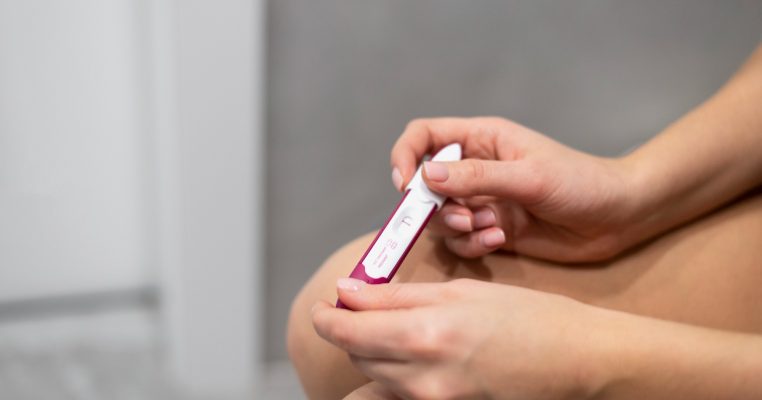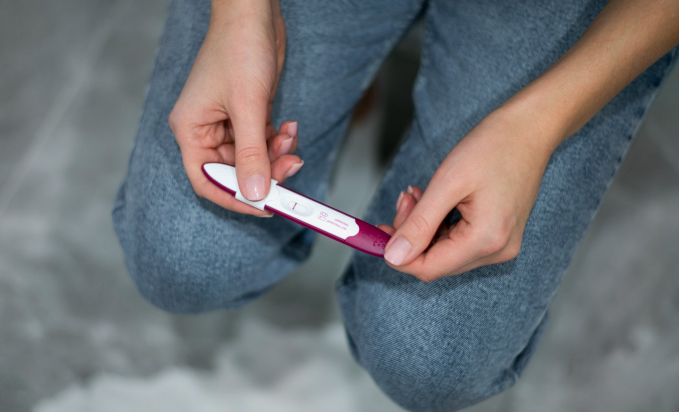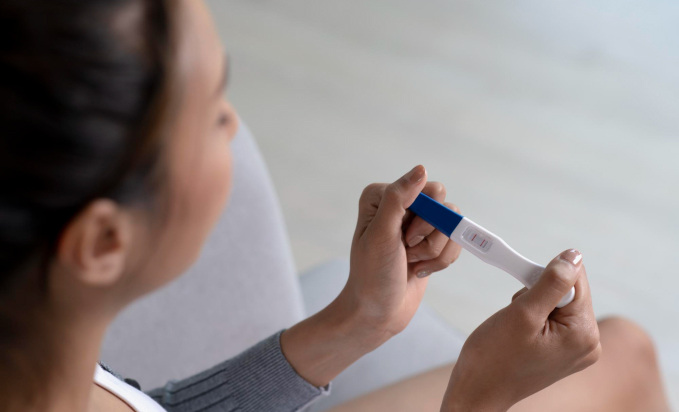
Pregnancy Test: Bringing a new child into the world is a rollercoaster of emotions — excitement, nervousness, anxiety, and joy.
There are a million things to do before your baby is born, but before you start comparing nursery colour schemes or child-proofing your home (or telling your loved ones) it’s important to check that you actually ARE pregnant. This means taking your pregnancy test (or tests) at the right time, to optimise its accuracy.
Whether or not you’ve been planning to have a baby, choosing when to take a pregnancy test can be a source of anxiety, so it’s best to be informed about all the factors involved.
If you’re reasonably sure you’re pregnant there are better times of day than others to check, but there is also a standard time to wait to get an accurate result.
How Soon Can I Take A Test?

You must wait until your period is late before you take a test. While the anticipation can be overwhelming, rushing to test too early may result in inaccurate results.
Home pregnancy tests detect the presence of human chorionic gonadotropin (hCG), a hormone produced during pregnancy.
It takes time for hCG levels to rise to a detectable amount, and testing too soon after conception may yield a false negative.
Waiting until the appropriate time, typically a week after a missed period, increases the likelihood of obtaining reliable results.
If you have an irregular menstrual cycle generally, this can make the process a little trickier, but definitely wait until you’re sure you should be menstruating.
What’s The Best Time Of Day?

It’s often said that there is a favourable time of day to take your pregnancy test, and this is true. Assuming you follow a regular day-night pattern (i.e., you work in the daytime and sleep at night), then early in the morning is the best time to check.
This is because the level of hCG will be more concentrated in the morning if you’ve not been to the toilet for a few hours. If you drink LOTS of water at night, or get up regularly to pee, then it is more likely to give a false reading, but not always.
And there is no stopping you testing at any time of the day. Sometimes afternoon or evening readings will give accurate results.
It’s important to remember that more diluted pee can produce a much weaker line on the tester, but this can also be an indication of an ectopic pregnancy, where there is an egg but it hasn’t attached itself to the uterus. This usually isn’t serious and will go away of its own accord, but if you feel ill consult your doctor.
Emotions

The emotional rollercoaster associated with the prospect of pregnancy can be overwhelming. Waiting for the right time to take a test adds an additional layer of stress for those eager to start or expand their families. It’s essential to maintain a balance between hope and realism during this waiting period.
Seeking support from a partner, friend, or family member can provide a much-needed outlet for emotions. Understanding that the timing of conception varies for each individual and that factors like stress can affect the menstrual cycle can help individuals cope with the emotional aspects of the process.
For those who have a possible unplanned or unwanted pregnancy this is also a very tough time, as some extremely important life decisions may lie ahead.
Make sure that you have support from friends and family, or if you’re in a situation where you can’t talk to them about it (traditional or strictly religious families, or younger people), there are plenty of anonymous support resources available in person at your doctor, or online or telephone.
Understanding How The Pregnancy Test Works

Read the leaflet! This is key to obtaining an accurate result. Follow the instructions closely. Most home testing kits require a little pee on a particular point, and then you just sit back and wait. Some (but not many)are more complex. Feel free to ask your pharmacist if you’re unsure.
Lots of women opt for a blood test, which can be obtained via your local healthcare provider, who should be able to tell you comprehensively whether or not you have a bun in the oven!
So, don’t rush or get too nervous or excited. If you’re hoping for a baby you’ll have months to enjoy being pregnant, or more fun trying if you’re not yet. But knowing the facts will help you to get the most accurate results as soon as possible.
So, How Does It Work?
A pregnancy test works on the principle of detecting a particular hormone known as human chorionic gonadotropin or hCG. The only hormone that develops during pregnancy, and the test detects this hormone in the human pee.
The tests use the human pee to look for hCG. Sometimes, the tests can also rely on blood for its detection. However, usually, the other fluid is enough for its detection.
- The at-home pregnancy kit is enough to give a confirmation of pregnancy and allow you to know when a person is pregnant.
- The correct usage of the pregnancy test can give you 99% accurate results.
- The human chorionic gonadotropin takes time to develop in the body, which is why timing the test correctly is essential.
As the days of your pregnancy pass, the hormone keeps developing. This will lead to more and more hormones within the body, and the pregnancy test will similarly show a positive result. Consequently, if you take the test too soon, you may have negative results.
- The pregnancy test kit reacts to the amount of hCG in the sample put in the test kit – usually pee.
- The urine test for pregnancy detection uses a reactive paper to detect hCG.
- Depending on the test kit, you will see a “plus” (+) sign for a positive result.
- The instructions on the test kit packet will help you know the signs to look out for a positive test.
Some test kits show vertical lines. Some display the word “pregnant” to denote a positive result. The test takes a little bit of your time to develop the result.
Some of them have a control window that first shows up. This indicates that the test is working, and you will have a result soon.
Do Blood Tests Take Longer?
Again, different tests have varying times within which they give the result. Taking a blood test for pregnancy confirmation includes your provider sending the blood to a pathology laboratory.
The sample will then be tested to determine the amount of hCG in your blood. You will receive the results from the lab or your provider.
After reading the process, you’ll learn that this test takes much longer than the pregnancy test kits available in pharmacological stores.
How should you proceed with the test? There are three ways you can go about this:
- Pee in a clean cup. Place one or several drops of the pee on the kit’s clean strip
- Place the test kit strip in your urine strip when you’re peeing
- Pee in a clean cup and dip the test strip in it while it is in the cup.
The test is usually accurate when you time it correctly. That is, you do it soon after missing your period. This is because missing a period usually occurs 14 days after conception. Also, keep these in mind:
- Check the expiration date on the packet.
- Don’t drink excess water, as it can dilute the hCG levels.
- Try to take the test with the first-morning pee.
This is how you complete a pregnancy test to know if you are pregnant after you’ve missed your period.
Also read









